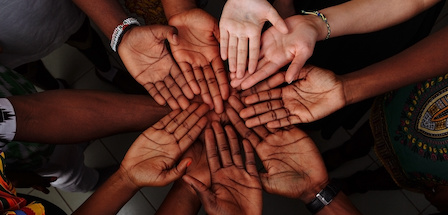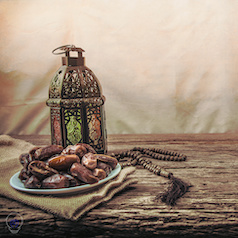Ramadan, Giving, & Abundance Thinking
Ramadan, Giving, & Abundance Thinking
 by Roohi Younus
by Roohi Younus
It’s 2020 and we are experiencing the first wave of the pandemic when the doors of all non-essential businesses are closed. Ramadan is here, an increased time of giving when most Muslim-led nonprofits receive a majority of their funding for the year. However, there is nowhere to physically go and fundraise. A national advocacy and service organization based in Chicago strategizes on how to make the most of this unique situation. Through a myriad of innovative organizing and physically distant methods, this group meets its fundraising goal well before the close of the month of Ramadan. After feeling overcome with relief and gratitude, this organization decides to give back. They elevate four other non-profits, who are also seeking to meet their fundraising goals, on their email list, imploring their constituents to learn about them and consider donating. This story from the Community Collaboration Initiative impresses me for the way in which Ramadan connects to giving and concepts of abundance.
Ramadan
The 2022 spring season marks a time when multiple faith traditions celebrate significant holidays. Jews retell the story of the Exodus while sharing in matzah during Passover, and brightly colored eggs are shared for Easter. In the Muslim faith of Islam, the faithful join a global cadence of worship, engaging in fasting during daylight hours and spending nights in worship and community for the month of Ramadan. In the converging of holidays, I’m reminded of how “Fasting is prescribed for you as it was prescribed to those before you” (Quran 2:183). And, as I assess the contents of our fridge, I am bewildered by the food we have amassed after 26 days of fasting. How did this happen when we are fasting from food and drink for 15 hours a day? Did I really buy that much hummus?
Aside from an abundant fridge, abstaining from food and drink is an equalizing moment. In the beginning of Ramadan, I am often immobilized by feelings of hunger, fatigue and insecurity. Regardless of socioeconomic status, healthy Muslims are prohibited from reaching for the glass of water when our mouths run dry with thirst. At the same time, this connection with the undernourished opens up an awareness. As an image of a mother fleeing conflict for the safety of her children flashes on the news, my heart opens to share resources in a genuine way. Through the course of the month, I find that I have built patience, fortitude and resiliency. This higher level of consciousness builds awareness that, through a triangular relationship with God and people, giving sincerely to others means that God, the Most Generous, will provide me even more in return. As in the opening story, when we believe there are enough funds for our cause and there is enough for others as well, we can find ways to uplift each other’s efforts without feeling threatened by competition.
Giving
As I write this article, I receive a call from a friend of a friend who is looking to donate grocery money to newly arrived Afghan refugees. Her request could relate to voluntary (sadaqah) or mandatory charitable giving (zakat). Muslims with means are required to contribute 2.5% of savings towards zakat annually. Zakat is considered a right of the poor, and in engaging in this redistribution of wealth with grocery money, for instance, we can discern that there will be reward for sponsoring multiple meals for a family, providing a dignified means for subsistence, a reward for the sincerity of the giver and possibly prayers of gratitude from the recipient. One act of giving can lead to a multiplied return. In total, this annual giving practice accumulated to $1.8 Billion in 2021.
In the front foyer of our home, we have a colorfully decorated mason jar atop our console table with the word “Sadaqa” written across it. This jar reminds even the youngest member of our household that we can choose to set money aside at any time for the benefit of others. Sadaqa has flexibility, and Muslims give this form of charity to a variety of causes. The estimated amount of charity given by Muslim Americans in 2021 is $4.5 billion. In fact, according to the Muslim Giving Report 2021, Muslims give more than the general population by 38%, which means that this can also be an important time for non-faith-based nonprofits.
Although this is an impressive amount for a minority community, it’s not the only way sadaqa is exercised. During Ramadan, I sit with my 4- and 6-year-old to reflect on the day. We use strips of colorful paper to write down their meritorious acts and turn them into a paper chain to see their good deeds grow. On one particular day, my son recounts how a joke of his had made me laugh and warmed me. “Remember,” he says “the Prophet Muhammad said that smile is a charity.” I ask him how it makes him feel. He answers, “My heart feels good.” From a young age, he understands that giving is about connecting and uplifting others just like the organization in the opening story. “Compared with the general population, Muslims are significantly more likely to include smiling, good intentions, helping relatives, commanding right actions, furthering good, not causing harm to others, and advocating for the oppressed as acts of philanthropy” (Muslim American Zakat Giving Report 2022).
Working with Abundance
Fasting in the month of Ramadan, the experience provides a way to be introspective where a strengthened relationship with God leads to a sincere and deep desire to benefit humanity, which in turn, benefits the giver who is part of humanity. A natural outcome of this priming is to seek ways to build positive social connections through acts of zakat and sadaqa. Thinking strategically about abundant thinking can transform organizational impact.
At the Community Collaboration Initiative (CCI), our team is supporting 21 Muslim-led nonprofit organizations on ways to collaborate with each other. With organizations overstretched in solving a large set of problems with a minimal set of resources, the environment creates an urgency that does not leave time for broader experimentation. Collaborations build upon the concept of brotherhood in the Muslim Faith. In a well-known saying of the Prophet Muhammad, “The believers in their mutual kindness, compassion and sympathy are just like one body. When one of the limbs suffers, the whole body responds to it with wakefulness and fever.” This builds upon the idea of removing competitiveness and embracing positivity, collaboration and genuine affection for each other. When the organization in the opening story shared its platform for others to raise funds, it exemplified how they see parallel efforts as the same body of work. In another example, a CCI organization instinctively applied for a grant on behalf of their collaboration. They were awarded the grant and shared the proceeds. In both of these examples, an abundance approach was realized. Abundance is further supported through the work of collaboratively applying for the Muslim Collaboration Prizes.
Through fasting, Muslims engage in self-work, building moral fortitude, patience and compassion in community with family, friends and congregations. The act of giving zakat and sadaqa creates a necessary inter-relationship between humanity, through the transfer of wealth and other acts of kindnesses. Both fasting and giving are tools to build oneself to collaborate with others in creating a better society. When we make space for others, we welcome the opportunity to build something greater than ourselves.
For more information, visit the Community Collaboration site.
Roohi Younus is the Program Manager and a Facilitator for the Community Collaboration Initiative. She seeks to uplift the sector as a non-profit consultant and social entrepreneur at R&R Strategists and MUSE Bookings respectively. Roohi has previously served as a Board Member and Executive Director at the Mohammed Webb Foundation. She resides in Woodridge, IL with her husband and three children.
Expanded Perspective

Kitchen Table Philanthropy in the Time of Ramadan
This April, Muslims around the world will be observing the holiday of Ramadan—a month-long period of fasting from dawn to sundown, and of thinking of others, and of giving back. Philanthropy is deeply rooted in the Muslim faith, as well as my own.
When I was a child, the month before Ramadan, my immigrant parents would sit at the kitchen table with my sister and me to discuss how our family could give back. They would tell us about a family relative back in India who could use our help. Maybe it was for something critical, like surgery; or something invaluable, like education; or something practical, like a sewing machine!
My working class family’s support was not extravagant, but we did what we could. This experience taught my sister and me that, even as kids, we had the power to make a transformational difference in others’ lives.
My husband and I are fortunate to continue the tradition of sitting at the kitchen table with our two sons to discuss our family values and the organizations we want to support in our community.
During one of those conversations a few years ago, we realized we weren’t prioritizing Muslim American-led nonprofits in our philanthropic giving—so we decided to change that.
Wanting to understand the challenges those organizations faced, I reached out to the organizations we support. From our discussions, I could see the devotion and humility these organizations possessed. Without connection to the broader philanthropic community and funding support, these organizations were caught in a mindset of scarcity.
My family wondered if these Muslim nonprofits could be supported in a way that could help them move away from a scarcity mindset to a mindset of abundance. The outcome of that family discussion was the funding of a three-year study project called the Community Collaboration Initiative (CCI) that has been focused on building trust and a collaborative culture among a select group of Muslim organizations.
For the past two years, these organizations have worked closely with CCI to deepen their collaborative skills. In 2022, the third and final year, these organizations have formed five teams working towards common goals.
To incentivize the organizations for participating in this time-intensive process, CCI launched the $1.5M Muslim Collaboration Prizes, in partnership with the Muslim Philanthropy Initiative (MPI) at the Indiana University Lilly Family School of Philanthropy, to foster a more collaborative mindset.
The Prizes include an “equitable twist” in guaranteeing a minimum award of $50,000 for any team that goes through the application process. In addition, rather than competing against each other, teams have the opportunity to receive up to $200,000 based on the evaluation of their applications against a set of criteria that assesses the quality and depth of the collaboration, and the long-term impact of proposed projects. These prizes are the culmination of an ongoing effort to help our Muslim nonprofits move away from a mindset of scarcity to a mindset of abundance and help them increase the collective impact of their work. If you are interested in supporting or learning more about the Muslim Collaboration Prizes, please contact me at dwaraich@iu.edu.
Dilnaz Waraich is President of the Waraich Family Fund. She has dedicated her family’s philanthropic efforts to engaging with diverse stakeholders, furthering pluralism and helping build bridges. Dilnaz holds a Master in Literacy degree from Northwestern University, and an MS and a BS from Loyola University. She is currently working on a Master in Spiritual Leadership.
Subscribe
Insights is a bi-weekly e-newsletter for the religious community and fundraisers of faith-based organizations that provides:
- Reflections on important developments in the field of faith and giving
- Recommended books, studies and articles
- Upcoming Lake Institute events
